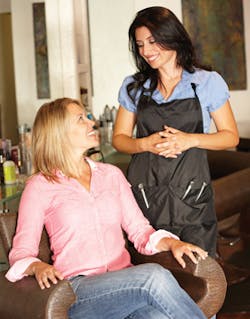by Eileen Morrissey, RDH, MS
I was at my beloved hairdresser for my six-week visit recently, and I got to thinking about chatter during maintenance visits. My hairdresser loves to talk, and it begins from the moment I plop myself into her chair. I enjoy it, but I was relating it to patients' recare visits in our offices. This session, in particular, I remember hoping that she would stop talking just for a moment so that I could request how I wanted my hair cut. Yikes! Have I ever had that effect on patients when I'm treating them in the dental office?
As a young practicing hygienist, I was more of a talker, and I succeeded in creating my own misery. Despite having one hour allocated for recare, I would spend a lot of time asking patients questions in my efforts to cultivate relationships. I then felt resentful when I had to remove my hands from the task at hand to hear their responses. Back in the day, I thought what I was doing was a good thing. However, I began burning out at a young age because it was almost impossible to stay on schedule. By the time I had been in that office for seven years and knew people really well, it seemed like it was more about the relationship than the clinical responsibility. Don't misunderstand me. I am not disregarding the importance of the need to nurture the relationship.
------------------------------------------------
Other articles by Eileen Morrissey
------------------------------------------------
Fast forward to practicing as a "mature" hygienist. I'm quieter now. Yes, there is small talk at the start of the visit, but once I get into the patient's mouth, my priority is to get the work completed. When the recare clock is ticking, time is precious and there can be no moments wasted on chatter. Upon completion of the treatment, if we're waiting for an exam, it's a great opportunity to catch up on socializing. I learned to prioritize!
Of course, the exception to this is patient education moments. I report to my client my observations as I proceed. If I come across an area that requires more of his or her diligence on the home front, I will stop, pick up a mirror, point out the area in the mouth, and show films or images, all in an effort to get the message across. And then it is back to the task at hand. Tip: to really drive a point home, I take the extra moment to sit the patient up as I point something out. Now we are at the same eye level, and the patient sees that whatever I have just discovered is important enough that I have momentarily stopped scaling to make him or her aware. There is something about this approach that makes a patient pay attention and remember.
On a related note -- it's important to find the balance as to just how much educating should take place during a visit. If you overwhelm people with information, you lose them. This is "new graduate syndrome," where we think we can change the world. There is nothing more unappealing than hearing a dissertation from a hygienist who proposes we spend a couple of hours in our bathrooms morning and evening maintaining our teeth. Consider baby steps; perhaps just one take-home tip to make it easier for the patient.
I informally surveyed many people who sit in the hygiene chair on the matter of treatment time chatter. It's a mixed bag of opinions. While many appreciate the distraction, the overwhelming majority find it annoying to be asked questions they cannot respond to when their mouths are open and being worked on. Many appreciate the professionalism of an individual who allows them quiet time during the visit … and sticks with professional dental topics during interactions. Some of the subscribers to the renowned Amy's List (dental hygiene Internet subscriber list) speak affectionately of the "chat and polish" hygienists. This is not considered an attribute!
What about the patient who desperately wants this time to talk to you? Maybe it's a lonely senior, an empty-nester, or a man who has recently lost a spouse. Might we want to prioritize such a time for this person so we can be a listening ear? How do we accomplish the clinical responsibilities, yet still give the person what he or she needs most? Is it always about removing stuff from teeth? This could be debated.
I believe that effective hygienists know how to read patients' body language and conversations so as to know when and how much to talk, and when to simply listen. It is about finding that elusive balance. Onward we go; it is in our hearts' core. RDH
EILEEN MORRISSEY, RDH, MS, is a practicing clinician, speaker, and writer. She is an adjunct dental hygiene faculty member at Burlington County College. Eileen offers CE forums to doctors, hygienists, and their teams. Reach her at [email protected] or 609-259-8008. Visit her website at www.eileenmorrissey.com.
Past RDH Issues







